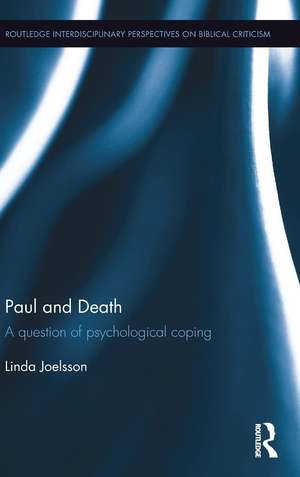Paul and Death: Routledge Interdisciplinary Perspectives on Biblical Criticism
Autor Linda Joelssonen Limba Engleză Hardback – 17 noi 2016
The concept of death, particularly violent death, is prevalent throughout the writings of Paul the Apostle. His letters in the New Testament address this topic from a variety of perspectives, some of which can appear to be almost contradictory. However, this need not be problematic. Paul and Death uses the method of psychological exegesis to show that the different attitudes toward death in Paul's letters make for a much more coherent discourse if they are seen as an aid to individual and collective psychological coping.
Taking the differences between each of Paul's letters as its starting point, this study suggests that a variety of coping strategies in relation to death may be beneficial depending on the situation, the person, and the stage of the coping process. Drawing on psychologically-oriented hermeneutic theory, and theories about psychological coping in particular, the author argues that each case of psychological coping must be understood in its historical situation, and as strategies emanating from a specific person's subjective appraisal.
Combining theology and biblical studies with modern psychology, this book will be of particular interest to academics and students that are studying the relationship between Religion and notions of Death.
| Toate formatele și edițiile | Preț | Express |
|---|---|---|
| Paperback (1) | 389.66 lei 6-8 săpt. | |
| Taylor & Francis – 12 dec 2019 | 389.66 lei 6-8 săpt. | |
| Hardback (1) | 1053.95 lei 6-8 săpt. | |
| Taylor & Francis – 17 noi 2016 | 1053.95 lei 6-8 săpt. |
Preț: 1053.95 lei
Preț vechi: 1285.31 lei
-18% Nou
201.67€ • 211.13$ • 166.87£
Carte tipărită la comandă
Livrare economică 05-19 aprilie
Specificații
ISBN-10: 1138239615
Pagini: 220
Dimensiuni: 156 x 234 x 18 mm
Greutate: 0.43 kg
Ediția:1
Editura: Taylor & Francis
Colecția Routledge
Seria Routledge Interdisciplinary Perspectives on Biblical Criticism
Locul publicării:Oxford, United Kingdom
Public țintă
Postgraduate and UndergraduateCuprins
2. Coping with Death in Paul’s Early Letters
3. The Corinthian Correspondence
4. Romans
5. The Prison Letters
6. Conclusions and Prospects for Further Research
Notă biografică
Descriere
The concept of death, particularly violent death, is prevalent throughout the writings of Paul the Apostle. His letters in the New Testament address this topic from a variety of perspectives, some of which can appear to be almost contradictory. However, this need not be problematic. Paul and Death uses the method of psychological exegesis to show that the different attitudes toward death in Paul's letters make for a much more coherent discourse if they are seen as an aid to individual and collective psychological coping.
Taking the differences between each of Paul's letters as its starting point, this study suggests that a variety of coping strategies in relation to death may be beneficial depending on the situation, the person, and the stage of the coping process. Drawing on psychologically-oriented hermeneutic theory, and theories about psychological coping in particular, the author argues that each case of psychological coping must be understood in its historical situation, and as strategies emanating from a specific person's subjective appraisal.
Combining theology and biblical studies with modern psychology, this book will be of particular interest to academics and students that are studying the relationship between Religion and notions of Death.














